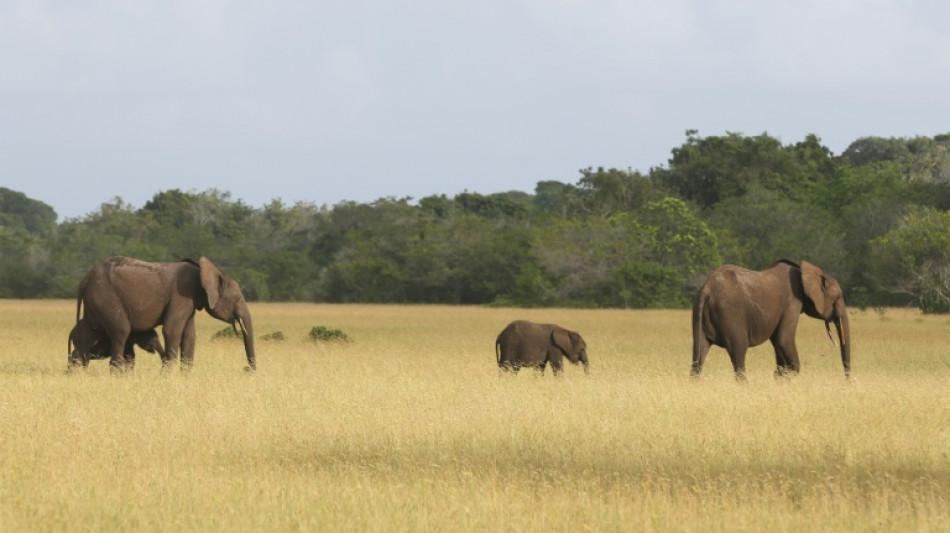
-
 Wales revel in being the underdogs, says skipper Lake
Wales revel in being the underdogs, says skipper Lake
-
German school students rally against army recruitment drive

-
 Wary European states pledge military aid for Cyprus, Gulf
Wary European states pledge military aid for Cyprus, Gulf
-
Liverpool injuries frustrating Slot in tough season

-
 Real Madrid will 'keep fighting' in title race, vows Arbeloa
Real Madrid will 'keep fighting' in title race, vows Arbeloa
-
Australia join South Korea in quarters of Women's Asian Cup

-
 Kane to miss Bayern game against Gladbach with calf knock
Kane to miss Bayern game against Gladbach with calf knock
-
Henman says Raducanu needs more physicality to rise up rankings

-
 France recall fit-again Jalibert to face Scotland
France recall fit-again Jalibert to face Scotland
-
Harry Styles fans head in one direction: to star's home village

-
 Syrian jailed over stabbing at Berlin Holocaust memorial
Syrian jailed over stabbing at Berlin Holocaust memorial
-
Second Iranian ship heading to Sri Lanka after submarine attack

-
 Middle East war spirals as Iran hits Kurds in Iraq
Middle East war spirals as Iran hits Kurds in Iraq
-
Norris hungrier than ever to defend Formula One world title

-
 Fatherhood, sleep, T20 World Cup final: Henry's whirlwind journey
Fatherhood, sleep, T20 World Cup final: Henry's whirlwind journey
-
Conservative Nigerian city sees women drive rickshaw taxis

-
 T20 World Cup hero Allen says New Zealand confidence high for final
T20 World Cup hero Allen says New Zealand confidence high for final
-
The silent struggle of an anti-war woman in Russia

-
 Iran hits Kurdish groups in Iraq as conflict widens
Iran hits Kurdish groups in Iraq as conflict widens
-
China sets lowest growth target in decades as consumption lags

-
 Afghans rally against Pakistan and civilian casualties
Afghans rally against Pakistan and civilian casualties
-
South Korea beat Philippines 3-0 to reach women's quarter-finals

-
 Mercedes' Russell not fazed by being tipped as pre-season favourite
Mercedes' Russell not fazed by being tipped as pre-season favourite
-
Australia beat Taiwan in World Baseball Classic opener

-
 Underdogs Wales could hurt Irish after Scotland display: Popham
Underdogs Wales could hurt Irish after Scotland display: Popham
-
Gilgeous-Alexander rules over Knicks again in Thunder win

-
 Hamilton reveals sequel in the works to blockbuster 'F1: The Movie'
Hamilton reveals sequel in the works to blockbuster 'F1: The Movie'
-
Alonso, Stroll fear 'permanent nerve damage' from vibrating Aston Martin

-
 China boosts military spending with eyes on US, Taiwan
China boosts military spending with eyes on US, Taiwan
-
Seoul leads rebound across Asian stocks, oil extends gains

-
 Tourism on hold as Middle East war casts uncertainty
Tourism on hold as Middle East war casts uncertainty
-
Bayern and Kane gambling with house money as Gladbach come to town

-
 Turkey invests in foreign legion to deliver LA Olympics gold
Turkey invests in foreign legion to deliver LA Olympics gold
-
Galthie's France blessed with unprecedented talent: Saint-Andre

-
 Voice coach to the stars says Aussie actors nail tricky accents
Voice coach to the stars says Aussie actors nail tricky accents
-
Rahm rejection of DP World Tour deal 'a shame' - McIlroy

-
 Israel keeps up Lebanon strikes as ground forces advance
Israel keeps up Lebanon strikes as ground forces advance
-
China prioritises energy and diplomacy over Iran support

-
 Canada PM Carney says can't rule out military participation in Iran war
Canada PM Carney says can't rule out military participation in Iran war
-
Verstappen says new Red Bull car gave him 'goosebumps'

-
 Swiss to vote on creating giant 'climate fund'
Swiss to vote on creating giant 'climate fund'
-
Google to open German centre for 'AI development'

-
 Winter Paralympics to start with icy blast as Ukraine lead ceremony boycott
Winter Paralympics to start with icy blast as Ukraine lead ceremony boycott
-
Sci-fi without AI: Oscar nominated 'Arco' director prefers human touch

-
 Ex-guerrillas battle low support in Colombia election
Ex-guerrillas battle low support in Colombia election
-
'She's coming back': Djokovic predicts Serena return

-
 Hamilton vows 'no holding back' in his 20th Formula One season
Hamilton vows 'no holding back' in his 20th Formula One season
-
Two-thirds of Cuba, including Havana, hit by blackout

-
 US sinks Iranian warship off Sri Lanka as war spreads
US sinks Iranian warship off Sri Lanka as war spreads
-
U.S. Polo Assn. Expands Collegiate Partnership Program to Record 70 Teams for 2026 Season


Time to put monetary value on conservation, says Gabon
A key UN summit this year must give biodiversity the same priority as climate change and press ahead with putting a financial value on natural resources, Gabon's environment minister says.
British-born Lee White, an ecologist who has helped make Gabon a powerful voice for the environment in central Africa, said Earth's climate and biodiversity crises went hand in hand.
COP15 -- an eagerly awaited conservation conference due to take place in Kunming, China, in the last quarter of 2022 -- must give biodiversity "the same level of priority as climate change", White said in an interview with AFP.
"We're looking at much higher ambition for conservation," he said.
"One of our priorities is the 30 by 30 target -- 30 percent protected areas across the planet by 2030 -- and moving the agenda forward on biodiversity credits, biodiversity financing."
Carbon credits, which have been around for more than two decades, offer financial incentives to reduce or avoid emissions of greenhouse gases.
Biodiversity credits would offer similar incentives to nurture conservation hotspots, which scientists say play a hugely under-estimated role in human survival.
"The Congo Basin stabilises Africa, it's the heart and lungs of Africa," said White, the author of dozens of research papers.
"Without the Congo Basin... we lose the rainfall in the Sahel, and you have hundreds of millions of climate refugees moving south," he said.
"We should be able to calculate that cost and then attribute it to the biodiversity services that the Congo Basin is providing. But today, biodiversity is worth zero."
Born in Manchester in northern England, White, 56, began his career in the African rain forests before he managed the activities of the Wildlife Conservation Society in Gabon for 15 years and in 2002 became an advisor to President Omar Bongo Ondimba for national parks and eco-tourism. In 2009, he was appointed minister for water, forests, the sea and environment.
- Gabon success -
White pointed to Gabon's own record in sequestering carbon by preserving its lush tropical forests.
In 2002, Gabon set up a network of 13 national parks covering 11 percent of its territory. Today, 22 percent of the land is protected.
In 2017, the country created 20 marine sanctuaries covering 53,000 square kilometres (20,500 square miles) -- the biggest ocean haven in Africa, and equivalent to 27 percent of its territorial waters.
"Since the Earth summit in Rio we have absorbed three billion tonnes of CO2," said White.
"I think if we find ways to give a value to all of that progress, if we find a way to find a value to our net sequestration of carbon, then other countries will maybe take a look at the Gabon example and potentially do something similar themselves."
Habitat conservation has helped Gabon's population of forest elephants grow from 60,000 to 95,000 animals, while across Africa numbers of this species have fallen by three-quarters.
This success story has a downside in conflict between elephants and humans, in which climate change also plays a part, said White.
- Hungry elephants -
Research at one of the forest sites, he said, has found that over 40 years, temperatures have risen by one degree Celsius (1.8 degrees Fahrenheit) and annual rainfall has fallen by 200 millimetres (7.9 inches), leading to a crash of 80 percent in rainforest fruits, which are a key part of the elephants' diet.
"The elephants are hungry -- we've actually proved scientifically that they are thinner," said White.
"So they are coming out of the forest as well because of climate change to eat people's fields, looking for food."
White said he had much sympathy for poor farmers who were exasperated by elephants which ate or trampled on their crops.
"The world loves elephants," he said.
"I would bet there are more elephants in Paris or London than there are in the whole of Africa. But those elephants are cuddly elephants -- they're toy elephants in children's bedrooms.
"Because for the West, the elephant is this wonderful lovely cuddly thing, and for rural African children, an elephant is a big scary thing that might have just killed their father or destroyed the food that they were going to eat in the next few months."
White said it was essential to resolve poaching in remote areas so that elephants could move away from areas inhabited by humans and back into their old habitat.
"We (also) have to protect rural people's crops, ideally using electric fences and other methods, rather than killing the elephants," he said.
"But we absolutely have to protect rural people's livelihoods and safety and quality of life."
This year, for the first time, the government has provided funds to help ease the elephant-human conflict, he said.
The equivalent of $5 million has been included in the 2022 budget for compensation for farmers whose crops have been damaged by tuskers.
D.Schneider--BTB




